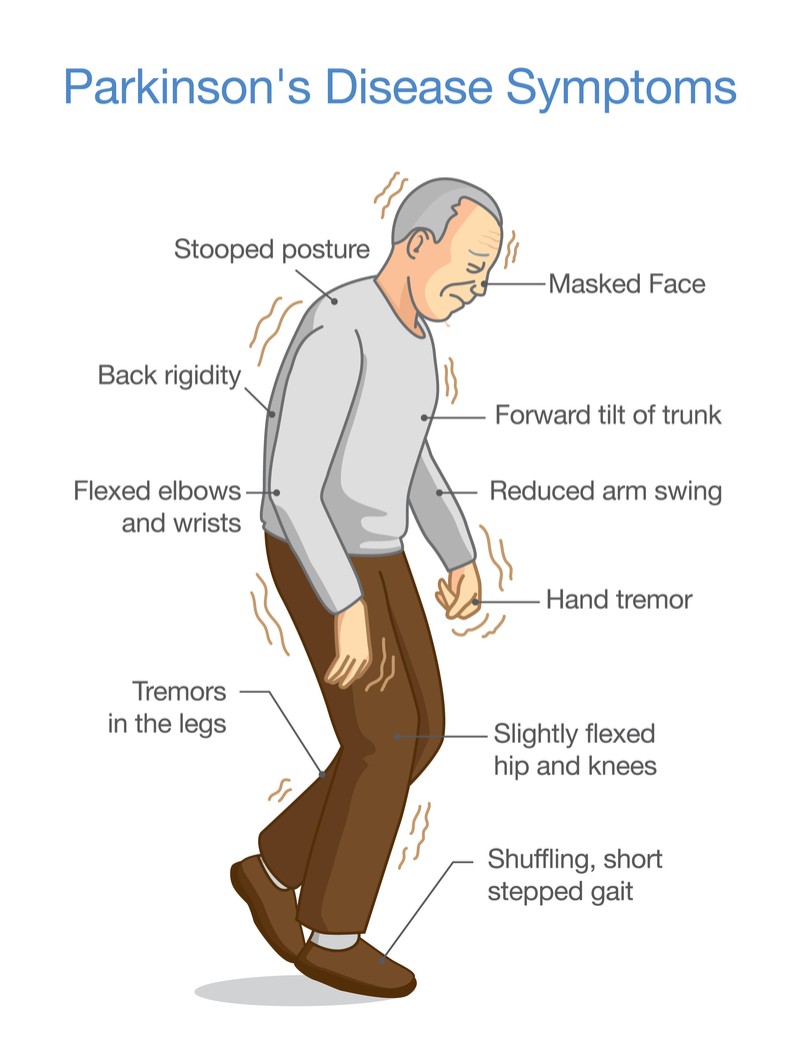Parkinson's Disease
Knowledge is Power.
True/False - Quiz: Do You Understand Parkinson's Disease?
Information - Parkinson's Disease
 Parkinson's disease is a a progressive nervous system disorder that affects the nerve cells in the brain that produce dopamine. Dopamine is a neurotransmitter that controls movement, and as the cells that produce dopamine die, Parkinson’s symptoms appear. Parkinson's typically affects patients over the age of 60, although it can affect younger patients.
Parkinson's disease is a a progressive nervous system disorder that affects the nerve cells in the brain that produce dopamine. Dopamine is a neurotransmitter that controls movement, and as the cells that produce dopamine die, Parkinson’s symptoms appear. Parkinson's typically affects patients over the age of 60, although it can affect younger patients.
Parkinson's Disease Symptoms
Parkinson’s disease symptoms often start slowly, beginning with a barely noticeable tremor in one hand or a lack of expression on your face. Over time, people with Parkinson’s disease may experience symptoms such as:
• More severe tremors
• Stiffness
• Slurred speech
• Stooped posture
• Slowed movement
• Changes in writing
• Muscle rigidity
Parkinson’s disease symptoms may begin on one side of the body and often remain worse on that side. The cause of Parkinson's disease is unknown, but genetics may play a role in rare cases. If many family members are affected by Parkinson's disease, it can be due to a specific genetic mutation. The diagnosis of Parkinson's disease is usually made by a neurologist, based on a history and physical examination. There are no specific diagnostic tests that will confirm the diagnosis. When an individual presents with characteristic findings and features of the disease and responds to dopaminergic medication or replacement of dopamine, it's usually enough to confirm the diagnosis.
Parkinson's Disease Treatment
 There is no cure for Parkinson’s disease but symptoms can be managed and people can live for years. Parkinson’s disease medications that increase or substitute for dopamine can help patients manage tremors and movement problems. Dopamine agonists are drugs that mimic dopamine and act on dopamine receptors to facilitate movement and reduce symptoms. The replacement of dopamine by using oral levodopa is probably the most effective way of managing Parkinson's disease symptoms, and the effects are almost immediate. In some cases, surgery might be recommended to regulate specific regions of the brain. Lifestyle changes can also help. Regular exercise with a physiotherapist or personal trainer can improve balance and mobility, and may even alleviate symptoms.
There is no cure for Parkinson’s disease but symptoms can be managed and people can live for years. Parkinson’s disease medications that increase or substitute for dopamine can help patients manage tremors and movement problems. Dopamine agonists are drugs that mimic dopamine and act on dopamine receptors to facilitate movement and reduce symptoms. The replacement of dopamine by using oral levodopa is probably the most effective way of managing Parkinson's disease symptoms, and the effects are almost immediate. In some cases, surgery might be recommended to regulate specific regions of the brain. Lifestyle changes can also help. Regular exercise with a physiotherapist or personal trainer can improve balance and mobility, and may even alleviate symptoms.
Talk to your family physician if you'd like more information on Parkinson's disease.
Visit HealthChoicesFirst.com for more videos and resources on family health.
Print this Action Plan and check off items that you want to discuss with your healthcare provider
-
Parkinson's typically affects patients over the age of 60, although it can affect younger patients.
-
Parkinson’s disease symptoms often start slowly, beginning with a barely noticeable tremor in one hand or a lack of expression on your face.
-
Over time, people with Parkinson’s disease may experience symptoms such as more severe tremors, stiffness, slurred speech, stooped posture, slowed movement, changes in writing and muscle rigidity.
-
The diagnosis of Parkinson's disease is usually made by a neurologist, based on a history and physical examination. There are no specific diagnostic tests that will confirm the diagnosis.
-
Parkinson’s disease medications that increase or substitute for dopamine can help patients manage tremors and movement problems. Dopamine agonists are drugs that mimic dopamine and act on dopamine receptors to facilitate movement and reduce symptoms.



